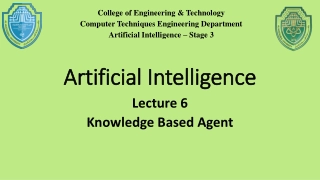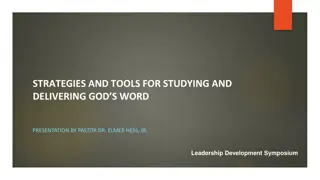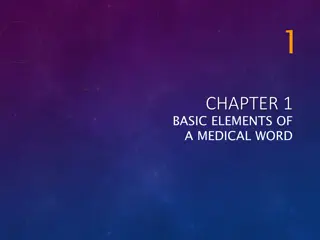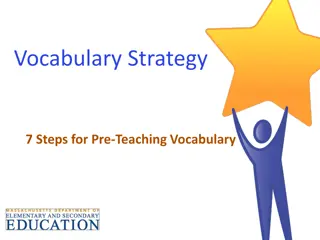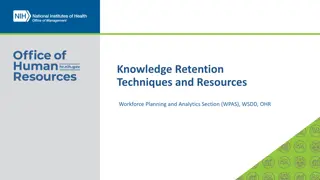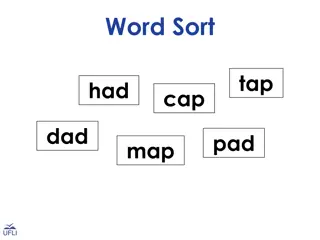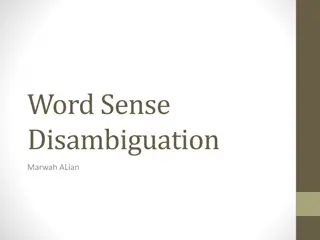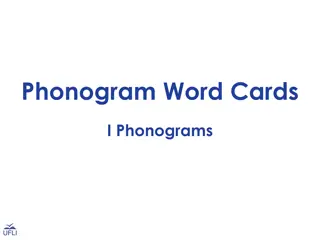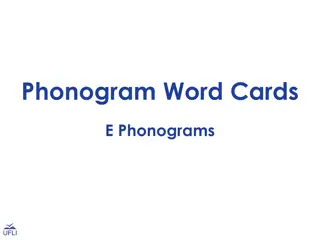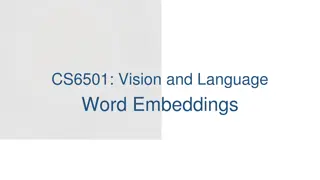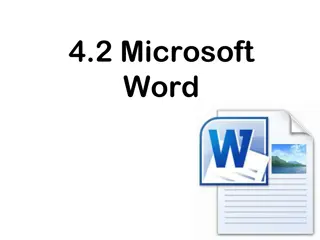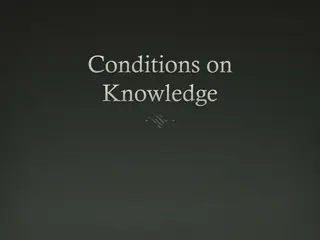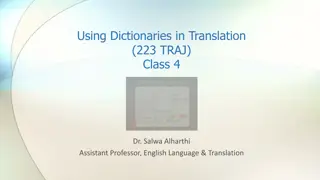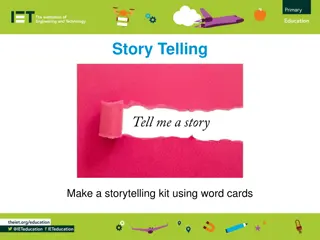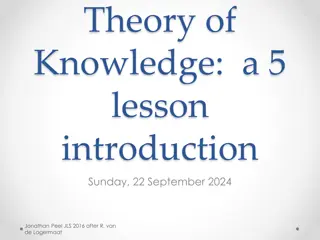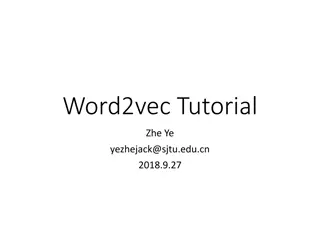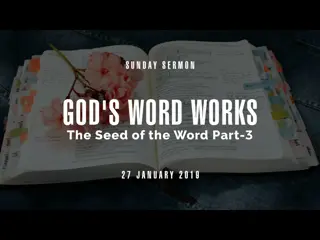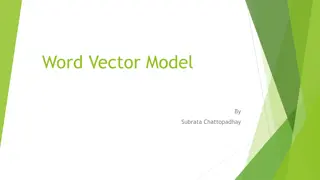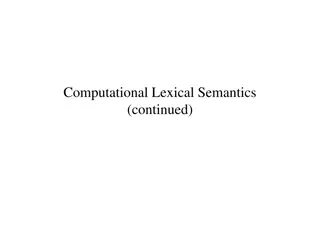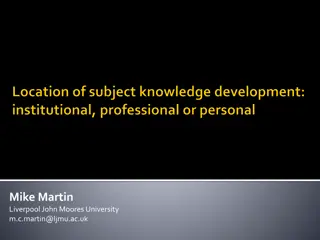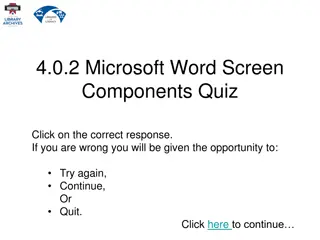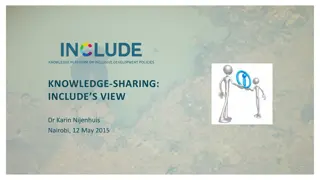Knowledge Capture
Knowledge capture is crucial for organizations to retain valuable expertise and prevent loss of critical knowledge due to employee turnover. Tacit and explicit knowledge play key roles, requiring strategic planning for retention, incentivizing knowledge-sharing culture, and implementing effective st
0 views • 6 slides
Exploring Product and Knowledge Graphs for Enhanced Information Retrieval
Dive into the world of product and knowledge graphs, uncovering the journey to a rich product graph, examples of knowledge graphs for songs, and the mission to provide comprehensive information on products and related knowledge. Discover use cases ranging from information provision to enhancing sear
3 views • 76 slides
Understanding Knowledge-Based Agents in Artificial Intelligence
Knowledge-Based Agents in AI utilize logic and knowledge representation to accept tasks, learn, and adapt to changing environments. Logic plays a crucial role in forming complex world representations and deriving actions based on inference. The central component is the Knowledge Base (KB), represent
4 views • 19 slides
Understanding Knowledge Management: Processes and Frameworks 2. In knowledge management, organizations create, share, and manage knowledge to enhance performance. It involves acquiring different types of knowledge through various means, such as perc
Knowledge Management, Organizational Objectives, Types of Knowledge, Tacit Knowledge, Explicit Knowledge
1 views • 17 slides
Strategies and Tools for Studying and Delivering God's Word Presentation
Explore the leadership development symposium led by Pastor Dr. Elmer Hess Jr., focusing on strategies and tools for studying and delivering God's Word. Participants aim to grow in their desire to know, live, and share the Word of God, emphasizing spiritual knowledge, growth, and influencing others.
3 views • 80 slides
Understanding Medical Word Elements: Roots, Combining Forms, Suffixes, and Prefixes
Medical terminology uses word elements like roots, combining forms, suffixes, and prefixes. Word roots provide the main meaning, combining forms connect elements, suffixes modify word meaning, and prefixes are placed at the beginning of words. Examples illustrate how these elements are used in medic
6 views • 13 slides
Pedagogical Shift in Physical Science: Constructing Knowledge Through Learner-Centered Experiences
There is a significant pedagogical shift in physical science education from viewing science as a fixed body of knowledge to emphasizing the process of constructing knowledge. Learners are now placed at the center stage, engaging in inquiry-based learning, critical thinking, and collaborative interac
3 views • 21 slides
Effective Pre-Teaching Vocabulary Strategies for ELs
ELs benefit from specific pre-teaching vocabulary strategies such as selecting important words, providing contextual understanding, offering student-friendly definitions, and engaging in oral interactions. Massachusetts Department of Elementary and Secondary Education emphasizes the importance of ch
2 views • 7 slides
Importance of Knowledge Retention in Organizations
Organizations face negative impacts on performance due to the loss of knowledge. Strategies such as exit interviews, mentorship, and knowledge sharing tools are vital for effective knowledge retention. Assessing knowledge retention maturity through various techniques is crucial, aligning with ISO st
0 views • 11 slides
Stages of First Language Acquisition in Children
First language acquisition in children progresses through distinct stages including cooing and babbling, the one-word stage, the two-word stage, and telegraphic speech. These stages mark the development of speech sounds, single-word utterances, two-word combinations, and more complex speech structur
2 views • 16 slides
Understanding Word Order in Different Languages
Explore the fascinating world of word order in languages. Discover how different languages arrange words in various ways, such as Subject-Verb-Object (SVO), Subject-Object-Verb (SOV), and more. Delve into the diversity of word orders for subjects, objects, and verbs, and uncover how language structu
2 views • 31 slides
Faithful Living and Preaching God's Word in 2 Timothy
In 2 Timothy, the call to preach the Word faithfully is emphasized, highlighting the importance of living with courage and commitment in spreading God's message. The text underscores the need to remain steadfast in the face of challenges and to uphold the truth of God's Word amidst changing times. T
0 views • 12 slides
Effective Knowledge Retention Strategies in Workforce Planning and Analytics
Retaining knowledge is crucial for organizations to enhance customer service, foster innovation, improve efficiency, and bridge skill gaps. This article explores the significance of knowledge retention, the types of knowledge essential for succession planning, and two effective strategies - the Know
1 views • 10 slides
Engaging Word Sorting Activity for Students
Encourage student engagement with a hands-on word sorting activity involving phonograms. Students copy word cards into categories, read each word, and determine its appropriate category in a fun and interactive manner using a sorting chart.
2 views • 5 slides
Understanding Word Sense Disambiguation: Challenges and Approaches
Word Sense Disambiguation (WSD) is a complex task in artificial intelligence that aims to determine the correct sense of a word in context. It involves classifying a word into predefined classes based on its meaning in a specific context. WSD requires not only linguistic knowledge but also knowledge
2 views • 12 slides
Phonogram Word Cards for Phoneme-Grapheme Correspondences
Explore lists of words with the same phonograms to teach new phoneme-grapheme correspondences, ideal for review games like Word Sorts and other activities requiring phonogram-based word lists. Enhance reading and spelling skills through engaging practices with word groups like nice, price, rice, sli
0 views • 26 slides
Phonogram Word Cards for Teaching Phoneme-Grapheme Correspondences
Explore a collection of phonogram word cards featuring various phoneme-grapheme correspondences for educational activities like word sorts and review games. Enhance phonics skills with word lists containing words sharing the same phonogram, covering a wide range of graphemes and phonemes. Utilize th
0 views • 32 slides
Understanding Word Meaning in Lexical Semantics
Introduction to Chapter 5 Lecture 4.1 discusses the nature of word meaning, major problems of lexical semantics, and different approaches. It explains the concept of a word, prototypical words, lexical roots, lexemes, and word forms, highlighting the importance of the word as a lexeme in lexical sem
1 views • 20 slides
Exploring Word Embeddings in Vision and Language: A Comprehensive Overview
Word embeddings play a crucial role in representing words as compact vectors. This comprehensive overview delves into the concept of word embeddings, discussing approaches like one-hot encoding, histograms of co-occurring words, and more advanced techniques like word2vec. The exploration covers topi
1 views • 20 slides
Understanding Microsoft Word: Features and Functions
Explore the key components and objectives of Microsoft Word, a versatile word processing tool in the Microsoft Office Suite. Learn about the user interface, commands, text manipulation, keyboard shortcuts, working with pictures and language tools, and the benefits of using word processing software.
0 views • 29 slides
Exploring Epistemology: Understanding Knowledge and Truth
Epistemology delves into the nature of knowledge, understanding, wisdom, and justification, questioning the extent of human knowledge and the different kinds of knowledge. It explores skepticism and conditions on propositional knowledge, discussing whether knowledge implies truth and the debate betw
1 views • 54 slides
Understanding Word Formation and Coinage in English
Word formation in English involves different processes such as compounding, conversion, and derivational affixation. Compounding combines two or more words to create a new word, while conversion changes the word class without affixes. Word coinage includes compounds, acronyms, back-formations, abbre
0 views • 10 slides
Navigating the World of Big Data, Knowledge, and Crowdsourcing
The world has evolved into a data-centric landscape where managing massive amounts of data requires the convergence of big data, big knowledge, and big crowd technologies. This transformation necessitates the utilization of domain knowledge, building knowledge bases, and integrating human input thro
1 views • 5 slides
Understanding the Role of Dictionaries in Translation
Dictionaries play a crucial role in translation by helping users find information about linguistic signs, word division, spelling, and word formation. The lemma serves as a representative of a lexical item in a dictionary, aiding users in locating specific entries. Word division information can assi
0 views • 12 slides
Creative Word Play Storytelling Kit
Unleash your creativity with the Creative Word Play Storytelling Kit using word cards. Safely cut out and sort the word cards into piles representing different parts of speech. Create unique sentences by combining cards from each pile and let your imagination run wild as you build stories. Expand th
0 views • 6 slides
Exploring the Nature of Knowledge in Theory of Knowledge
Delve into the essence of knowledge with Jonathan Peel's introduction to Theory of Knowledge, pondering on how different disciplines perceive knowledge, the impact of empirical questioning, and timeless wisdom on ignorance and progress. Explore the concept of basic knowledge and its implications, in
0 views • 37 slides
Understanding Modelling Knowledge and Knowledge Representation
Explore the significance of modelling knowledge through knowledge representation, making it explicit, independent, and reusable. Learn why knowledge representation is essential and how it facilitates exchange, query, inference, and visualization. Delve into examples of knowledge application in vario
0 views • 30 slides
Understanding Word Vectors and Training with Gensim
Explore the differences between one-hot representation and word vectors, learn about virtual environments in Python for training word vectors, and dive into the process of evaluation, analogy, and word clustering. Discover tools like Anaconda and Virtualenv, popular libraries like Gensim, and the si
0 views • 16 slides
Understanding Text Similarity Techniques in NLP
Explore various text similarity techniques in Natural Language Processing (NLP), including word order, length, synonym, spelling, word importance, and word frequency considerations. Topics covered include bag-of-words representation, vector-based word similarities, TF-IDF weighting scheme, normalize
2 views • 62 slides
Understanding the Parable of the Sower and Receiving God's Word
The Parable of the Sower teaches us how to receive and nurture God's Word in our hearts to produce fruit in our lives. Through the seed of God's Word, we learn the importance of protecting, understanding, and guarding our hearts from distractions and challenges that may hinder its growth and impact.
0 views • 24 slides
The Power of the Word: Lessons on Faith Chapter 17
Discover the profound impact of the Word of God on our lives as portrayed in Lessons on Faith Chapter 17. Just as the earth thrives with rain and snow, our lives flourish with the Word. Embrace the transformative power of God's Word and let it work within you to bring forth righteousness and peace.
0 views • 13 slides
The Sunday of the Word of God Celebration - 24th January 2021
The Sunday of the Word of God, observed on the 24th of January 2021, is dedicated to the celebration, study, and dissemination of the Word of God. Pope Francis encourages Catholics worldwide to deepen their relationship with God through His Word. The event highlights the importance of valuing both t
0 views • 27 slides
Understanding Word Vector Models for Natural Language Processing
Word vector models play a crucial role in representing words as vectors in NLP tasks. Subrata Chattopadhyay's Word Vector Model introduces concepts like word representation, one-hot encoding, limitations, and Word2Vec models. It explains the shift from one-hot encoding to distributed representations
0 views • 25 slides
Understanding Word Sense Disambiguation in Computational Lexical Semantics
Word Sense Disambiguation (WSD) is a crucial task in Computational Lexical Semantics, aiming to determine the correct sense of a word in context from a fixed inventory of potential word senses. This process involves various techniques such as supervised machine learning, unsupervised methods, thesau
0 views • 67 slides
Understanding Subject Knowledge Development in Education
Exploring the complexities of subject knowledge development in education, this study delves into areas such as students' existing knowledge, competencies, and the role of institutions in shaping knowledge acquisition. The focus lies on personalizing knowledge to individual needs rather than a fixed
1 views • 22 slides
Microsoft Word Screen Components Quiz: Test Your Knowledge
Test your knowledge of Microsoft Word screen components with this interactive quiz. Identify various components like the Horizontal Ruler, Minimize Button, Bold Button, Title Bar, Spell Check Button, Selection Toolbar, Cut Button, and more. See if you can score high and learn about the essential fea
0 views • 31 slides
Knowledge Sharing and Inclusive Development Policies
Knowledge Platform on Inclusive Development Policies (INCLUDE) focuses on enhancing research utilization in policy-making to foster more inclusive development. It was established in 2012 with the aim of bridging the gap between research and policy processes in African countries. INCLUDE engages expe
0 views • 8 slides
Vocabulary Review Exercises: Test Your Word Knowledge
Enhance your vocabulary skills with interactive exercises where you choose the correct word to complete sentences. From identifying scents to describing actions, these exercises offer a fun way to reinforce your word understanding and usage.
0 views • 35 slides
Understanding Morphology in Linguistics
Morphology is a branch of linguistics that focuses on word structure and the smallest meaningful units of language known as morphemes. It delves into the decomposition of words and the classification of morphemes into bound and free categories. Bound morphemes, such as prefixes and suffixes, modify
0 views • 16 slides
Biblical Faith and Obedience in Action: Just Believe and Obey God's Word
The statement "Thy word is settled in Heaven" highlights the authority and power of God's word, emphasizing the fulfillment of His promises. Belief, knowledge, reasoning, and obedience are all interconnected in expressing true faith as illustrated through various biblical references. The call to "Ju
0 views • 6 slides


